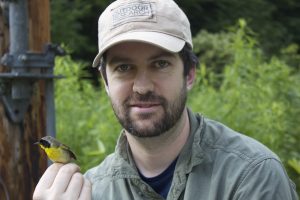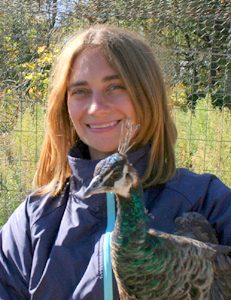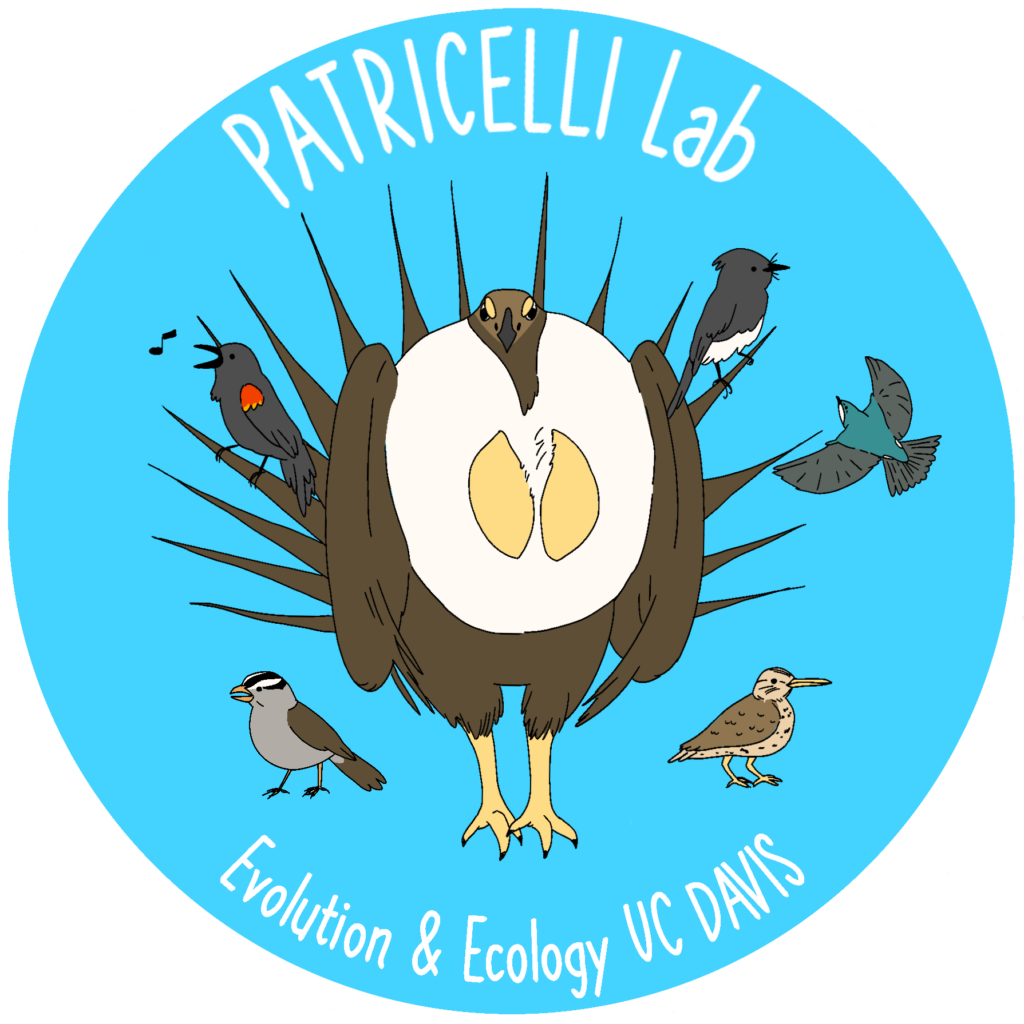CURRENT GRAD STUDENTS
 Clay Jones (email)
Clay Jones (email)
Clay is a PhD student in the Animal Behavior Graduate Group and joined the lab in Fall 2024. They are interested in communication, social learning, and social network dynamics among group-living animals. For their dissertation, they want to study how birds share information about habitat and food quality with each other and use social information to decide where to travel and forage. Clay is also helping Project Phoebe with field data collection, nest monitoring, and assisting with analyses of phoebe vocalizations. Before coming to UC Davis, Clay completed their M.S. in Biology at Villanova University, where they studied how Carolina Chickadees communicate at food sources. They found that chickadees tend to use certain call elements more often when food is available versus unavailable at a particular location; those call elements could coordinate flock movements and potentially convey information to listeners about current food conditions. Before their graduate work, Clay received their B.A. from Cornell University with a major in Ecology and Evolutionary Biology and minors in Linguistics and French. While at Cornell, they also studied how social feedback influences song learning in juvenile Zebra Finches. Their passion for linguistics and learning new languages has worked hand-in-hand with their curiosity about animal communication systems; they just want to know how all people and animals talk to each other!
 Nicole Lindenauer (email)
Nicole Lindenauer (email)
Nicole is a Master’s student in the Graduate Group in Ecology. Her research interests revolve around conservation management for species of concern. For her master’s project, she is working with Dr. Peter Coates’ Lab at the US Geological Survey (USGS) to conduct a field study of Greater Sage-Grouse in the Eastern Sierra Nevada to inform management decisions that optimize population restoration efforts. She will compare the efficacy of two translocation methods and create source-sink habitat maps to determine suitable future release site locations. Nicole earned her Bachelor’s degree in Evolution, Ecology, and Biodiversity at the University of California Davis in 2020 and went on to work with sage-grouse as a USGS intern. Outside of her graduate student life, Nicole is an avid outdoors woman and loves to travel to new ecosystems all over the world.
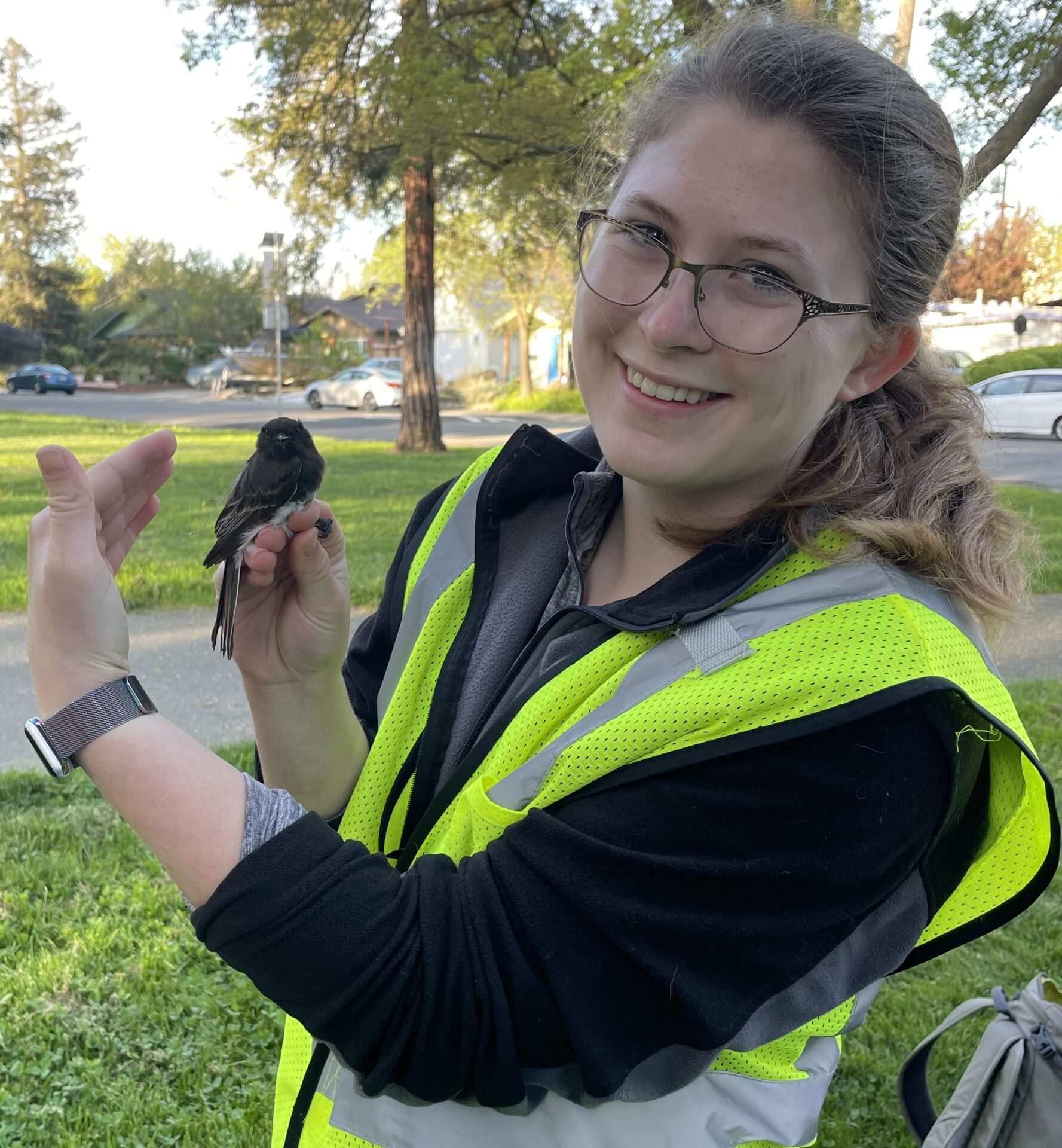 Sage Madden (email)
Sage Madden (email)
Sage’s Google Scholar Page
Sage’s ORCID page
Sage is a PhD Student in the Graduate Group in Ecology. Her research interests revolve around the behavioral and physiological responses of animals to human-induced environmental change, including urbanization and climate change, and whether these responses are adaptive. Sage’s dissertation is focused on the Black Phoebe, a small flycatcher species that is common in urban and riparian areas along the western coast of the United States. Her research seeks to understand whether Phoebes living in urban, rural, and riparian areas of the Central Valley of California differ in their behavioral and physiological responses to extreme temperatures. If she finds behavioral and physiological differences between urban and non-urban Phoebes, Sage also plans to investigate how these phenotypic differences relate reproductive success across environments. Sage’s work on the Phoebes is part of a larger collaborative effort among three graduate students to study the response of this species to global change; you can learn more about the project here: www.projectphoebe.com. Sage’s research is funded in part by an NSF Graduate Research Fellowship. Aside from research, Sage is interested in community engagement with science, especially via community and citizen science projects such as eBird and NestWatch. She is a Community and Citizen Science in Conservation Fellow with the UC Davis Center for Community and Citizen Science, where she is learning how to incorporate community science approaches into her research. She is also involved with K-12 outreach efforts through the Society for Advancement of Chicanos/Hispanics & Native Americans in Science (SACNAS). Before joining the Graduate Group in Ecology at UC Davis, Sage completed her Bachelor’s degree at University of Colorado Boulder with a double major in Ecology and Evolutionary Biology and Anthropology. While in Boulder, she spent three years studying Barn Swallow life history traits and parental care behavior in Dr. Rebecca Safran’s lab.
Sage’s Publications:
McDermott, M. T., Madden, S. A., Laubach, Z. M., Ayala, M. J., & Safran, R. J. (2023). Females with Increased Costs Maintain Reproductive Output: A Field Experiment in A Common Songbird. Integrative and Comparative Biology, icad042. DOI: 10.1093/icb/icad042
Madden, S. A., McDermott, M. T., Safran, R. J. 2022. Visitation rate, but not foraging range, responds to brood size manipulation in an aerial insectivore. Behavioral Ecology and Sociobiology, 76(10), 1-16. DOI: 10.1007/s00265-022-03244-z
Ayala, M.J., Carter, K. C., Fachon, A. S., Flaxman, S. M., Gil, M. A., Kenny, H. V., Laubach, Z. M., Madden, S. A., McDermott, M. T., Medina- García, A., Safran, R. J., Scherner, E., Schield, D. R., Vasquez-Rey, S., Volckens, J. 2021. Belonging in STEM: an interactive, iterative approach to create and maintain a diverse learning community. Trends in Ecology and Evolution, 36(11), 964-967. DOI: 10.1016/j.tree.2021.08.004
 Belle Malley (email)
Belle Malley (email)
Belle is a Master’s student in the Graduate Group in Ecology. She is interested in restoration precision management within post-fire landscapes. For her thesis project, she is working with Dr. Peter Coates’ Lab at the US Geological Survey (USGS) where she is studying the utilization distributions of Greater sage-grouse in wildfire-affected areas. This research will aid in identifying landscape elements that influence brood survival. Prior to graduate school, Belle received her Bachelor’s in Biology at Sonoma State University. Outside of her graduate studies, she enjoys rockhounding, bird watching, and snowboarding at moderate speeds.
 Maria C. Ospina (email)
Maria C. Ospina (email)
Maria is a PhD student in the Graduate Group in Ecology. Maria’s previous research experience at the University of Florida, where she graduated with honors in Biology, has ranged from investigating ant-plant mutualisms, coral reefs, to birds. After graduation in 2015, she spent two years living abroad in Asia, Argentina, and Australia, while expanding her skill set in avian field techniques. Drawing from her experience in avian behavior, communication, and conservation, Maria joined the Patricelli Lab seeking to understand how survival mechanisms (e.g. foraging, anti-predator behavior, interspecific, and intraspecific communication) in birds are impacted by anthropogenic disturbance. In other words, how do avian communities mitigate the effects of disturbance caused by human activities to survive? Maria’s dissertation research addresses how wildfire impacts foraging behavior, courtship and reproductive success in a species of conservation concern, the greater sage-grouse. Maria’s interest in community ecology has connections to her experience as an immigrant from Colombia: community support here in the United States helped ease her integration process. Having also worked as a community organizer and digital influencer for the immigrant community in Florida, one of Maria’s central goals is to be a catalyst for marginalized people to learn about the scientific process and potentially pursue a career in STEM.
 Jessica Schaefer (email)
Jessica Schaefer (email)
Jessica’s research interests comprise how ecology shapes reproductive behavior, from the scale of individual organisms to the evolution of mating systems. As a PhD candidate in the Animal Behavior Graduate Group, Jessica focuses on environmental variation, reproductive behavior, and endocrinology of shorebirds. For her dissertation project she is conducting a field study of Spotted Sandpipers (Actitis macularius), a socially polyandrous species, breeding in the Mono Basin of the Eastern Sierra Nevada and elucidating how ecological factors and hormone levels relate to variation in mating and parental care. Jessica earned her Bachelor’s degree in Biological Sciences at the University of Notre Dame in 2015 and went on to conduct research in the rocky intertidal of Panama and Hawaiʻi. She completed a Master’s in Zoology at the University of Hawaiʻi at Mānoa in 2019 with a thesis project on the genetic mating system of a species of intertidal limpet. Jessica is also interested in expanding ways for students and the public to engage with scientific inquiry; she previously program coordinated a citizen science project for K-12 students in Hawaiʻi and is currently editor for The Ethogram, a blog about animal behavior.
Jessica’s Publications:
Ward, RJ, TE Cox, A Faucci, FF La Valle, J Philippoff, JLB Schaefer, IM Ware, and ML Knope (2023). Spatial variation and antecedent sea surface temperature conditions influence Hawaiian intertidal community structure. PLoS ONE, 18(6): e0286136. https://doi.org/10.1371/journal.pone.0286136.
Iverson, AR, JLB Schaefer, S Skalos, and C Hawkins (2023). Global positioning system (GPS) and platform transmitter terminal (PTT) tags reveal fine-scale migratory movements of small birds: A review highlights further opportunities for hypothesis-driven research. Ornithological Applications, duad014. https://doi.org/10.1093/ornithapp/duad014.
LaValle, FF, JLB Schaefer*, TE Cox, and J Philippoff (2020). Spatial and temporal patterns in Hawaiʻi’s intertidal: decadal changes in benthic community composition. Hydrobiologia, 847, 3321–3336. https://doi.org/10.1007/s10750-020-04336-5. *JS and FLV contributed equally to this publication.
Schaefer, JLB, JH Christy, and PB Marko (2020). Multiple and extra-pair mating in a simultaneous hermaphrodite, the intertidal limpet Siphonaria gigas. Integrative Organismal Biology, 2(1), obaa013. https://doi.org/10.1093/iob/obaa013.
 Eric F. Tymstra (email)
Eric F. Tymstra (email)
Eric’s Blog: http://scienceisgay.weebly.com/
Eric’s Twitter: https://twitter.com/eftymstra
Eric joined the Patricelli Lab in Fall, 2016. He is a PhD student in the Graduate Group in Ecology. His research interests include behavior, conservation, and sensory ecology. For his dissertation research, Eric is working with the Greater sage-grouse (Centrocercus urophasianus) in Wyoming and Bishop, California in order to answer questions about how individuals forage off-leks and how this may affect lek social structure. He is also interested in social structure of leks and how the social landscape is affected by personalities of individuals and physical structures. Eric is also working on a project with turkey vultures (Cathartes aura) and researching how multimodal behaviors may allow for greater plasticity in the face of human induced rapid environmental change. Unsurprisingly, Eric is motivated by finding ways to inform conservation efforts with behavioral research. Before coming to UC Davis, Eric worked as a seasonal technician and research assistant in various bird-related labs at UC Berkeley and UC Santa Cruz. He also worked as an education program manager for wildlife related nonprofits. Before that, Eric graduated from UC Berkeley with a BS in Molecular Environmental Biology: Animal Health and Behavior. Aside from research, Eric is passionate about natural history, bird-watching, fly-fishing, fitness, and engaging people in science and conservation. In particular, Eric strives to allow underrepresented groups find paths in and to science. As such, Eric is the co-chair of the Education and Outreach committee for the UC Davis chapter of the Society for Conservation Biology. On weekends it is not uncommon to find Eric chest-high in Putah creek chasing down trout and listening to birds. Or watching Netflix. Really a 50/50 there.
FORMER GRAD STUDENTS
 Alicia K. Bird (email)
Alicia K. Bird (email)
Alicia’s Google Scholar Page
Alicia completed her dissertation in 2021 in the Patricelli Lab through theGraduate Group in Ecology. Alicia’s research addresses animal’s behavioral and physiological responses to environmental change and anthropogenic disturbances. In particular, Alicia’s PhD research examines the impacts of human-produced noise on mate choice in adult tree swallows and methylation patterns in nestlings. Prior to joining the Graduate Group in Ecology at UC Davis, Alicia completed her master’s thesis at San Francisco State University in 2016. Her MS research examined the salamander microbiomes in various Ensatina eschscholtzii subspecies and sympatric Batrachoseps species with professors Andy Zink and Vance Vredenburg. Alicia is now an Wildlife Biologist at the California Department of Fish and Wildlife.
Alicia’s Publications: Google Scholar Page
 Jessica L. Blickley (email)
Jessica L. Blickley (email)
Jessica’s Webpage: http://jessicablickley.com/
Jessica completed her dissertation in 2012 in the Patricelli Lab through the Graduate Group in Ecology. Jessica’s dissertation research in the Patricelli Lab investigated the impacts of noise pollution on greater sage-grouse; you can read more about her work here and here. After graduation, Jessica worked as as the Instruction & Research Specialist for the Sciences in the Center for Digital Liberal Arts at Occidental College. Jessica is now an Assistant Professor of Natural Sciences at Pasadena City College.
Jessica’s Publications: Google Scholar
 Melissa A. Blundell
Melissa A. Blundell
Melissa’s Linkedin Profile
Melissa Blundell earned her Master’s Degree in the Animal Behavior Graduate Group in 2012. Melissa was funded by an NSF Graduate Research Fellowship. She investigated fighting and aggressive behaviors in sage-grouse and the role of laterality in sexual selection. Melissa is now a Biologist and Project Manager with Dudek Environmental & Engineering.
Melissa’s Publications:
Krakauer, Alan H., Melissa A. Blundell, Tawny N. Scanlan, Michelle S. Wechsler, Emily A. McCloskey, Jennifer H. Yu, Gail L. Patricelli. 2016. Successfully mating male sage-grouse show greater laterality in courtship and aggressive interactions. Animal Behaviour 111: 261–267. LINK
Pellis, Sergio M., Melissa A. Blundell, Heather C. Bell, Vivien C. Pellis, Alan H. Krakauer, Gail L. Patricelli. 2013. Drawn into the vortex: The facing-past encounter and combat in lekking male greater sage-grouse (Centrocercus urophasianus). Behaviour. 150:1567-1599. PDF
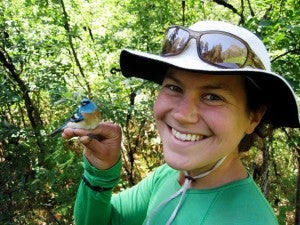
Mary K. Clapp (email)
Mary’s ResearchGate Profile and ORCID
Mary completed her dissertation in 2021 in the Patricelli Lab through the Graduate Group in Ecology. Mary’s research interests lie at the intersection of animal behavior and ecology, especially where human-induced changes to the environment have altered how organisms interact with their habitat and each other. Her dissertation research addresses how birds and bats around high-elevation lakes in the Sierra Nevada mountains use insects as a food resource during the summer breeding season, and how the introduction of non-native trout to those lakes may have altered the dynamics of that food resource. To do so, she is using both long-term audio recordings and traditional observations to address differences in bird and bat activity at lakes with and without trout. A large part of her work is investigating the utility of acoustic recordings in ecological research and management. Mary’s research was funded in part by an NSF Graduate Research Fellowship. Prior to joining the Graduate Group in Ecology at UC Davis, Mary received her Bachelor’s degree in Biology and English at St. Mary’s College of Maryland in 2009. She has worked as a seasonal field biologist on a variety of wildlife management and monitoring projects in Yosemite, Sequoia, and Kings Canyon National Parks, and for Point Blue Conservation Science, and continues to work in collaboration with the National Park Service. Mary is also interested in the power of natural history, science writing, and outreach to connect the wider community to science. She is a co-founder and curriculum writer for the UC-Davis chapter of GOALS (Girls’ Outdoor Adventure in Leadership and Science). Mary is now an Avian Acoustic Biologist with the Institute for Bird Populations (IBP).
Mary’s Publications:
Buxton, R.T., McKenna, M.F., Clapp, M., Meyer, E., Stabenau, E., Angeloni, L.M., Crooks, K., Wittemyer, G. 2018. Efficacy of extracting indices from large-scale acoustic recordings to monitor biodiversity. Conservation Biology 32(5): 1174-1184.
Price, J.J., Clapp, M.K., and Omland, K.E. 2011. Where have all the trees gone? The declining use of phylogenies in animal behaviour journals. Animal Behaviour 81(3):667-670.
 Ian Haliburton (email)
Ian Haliburton (email)
Ian earned his Master’s Degree in the Animal Behavior Graduate Group in 2024. Ian was one of the co-leads of the Patricelli Lab’s Project Phoebe, a research effort which seeks to understand the lives of urban birds, using the Black Phoebe and several riparian-urban gradients in Yolo and Sacramento counties as a model system. Ian is thrilled to have supported conservation of one of his favorite backyard birds, and he is infinitely grateful for the mentorship and community engagement opportunities that local urban ecology fieldwork offered. Before grad school, Ian received a BS in neuroscience from UCLA and promptly kick started a much-needed transition to a life of fieldwork and wildlife, working for a habitat restoration nonprofit in his hometown of San Diego, CA. Ian is an illustrator, an avid naturalist and a bird dad to two adorable budgies. Ian is now working as a naturalist for the San Diego Natural History Museum.
 Carly E. Hawkins (email)
Carly E. Hawkins (email)
Carly earned her PhD in the Animal Behavior Graduate Group in 2024. Her dissertation research addressed alternative tactics that individuals use to manage tradeoffs during reproduction – in particular how individuals balance their time and effort in seeking multiple partners, investing in existing partnership, and/or raising their young in monogamous systems. Carly examined how variation in individual male courtship tactics can lead to differences in reproductive composition – the ratio of offspring sired within their nest to offspring sired outside of their nest – among males in a population of white-crowned sparrows (Zonotrichia leucophrys oriantha). Carly’s research was funded in part by a fellowship from the ARCS Foundation (2021-2023). Before joining the Animal Behavior Graduate Group at UC Davis, Carly completed her M.S. in Biology at The College of William & Mary, where she investigated social responses to traffic noise in free-living red-backed fairywrens (Malurus melanocephalus) and in captive zebra finches (Taeniopygia guttata). Prior to her graduate work, she graduated from Penn State University with a B.S. in Biology and a minor in Wildlife & Fisheries Science.
Carly’s Publications:
Hawkins, C.E., Pantel, J.H., Palia, S.T., Folks, C.C., Swaddle, J.P. Zebra finches increase social behavior in traffic noise: Implications for urban songbirds. acta ethologica (2024). DOI: https://doi.org/10.1007/s10211-023-00434-4
Hawkins, C.E., Ritrovato, I.T*., Swaddle, J.P. (2020) Traffic noise alters individual sociality, but not space-use, of Red-backed Fairywrens. Emu – Austral Ornithology, DOI: 10.1080/01584197.2020.1830706
Iverson, A., Schaefer, J., Skalos S., Hawkins, C. (2023) Global Positioning System (GPS) and Platform Transmitter Terminal (PTT) tags reveal fine-scale migratory movements of small birds: a review highlights further opportunities for hypothesis-driven research. Ornithological Applications, DOI: https://doi.org/10.1093/ornithapp/duad014
Hendrix, T.C., Fernandez-Duque, F., Toner, S., Hitt, L.G., Thady, R., Massa, M., Hagler, S., Armfield, M. Clarke, N., Honscheid, P, Khalil, S., Hawkins, C.E., Lantz, S.M., Welklin, J.F., Swaddle, J.P., Webster, M.S., Karubian, J. (2023) Behavioural differences between ornamented and unornamented male Red-backed Fairywrens (Malurus melanocephalus) in the nonbreeding season. Emu – Austral Ornithology, DOI: 10.1080/01584197.2023.2182224
Lawanprasert, A., Guinan, C.A., Langford, E.S., Hawkins, C.E., Sloand, J.N., Fescemyer, H.W., Aronson, M.R., Halle, J.A., Marden, J.H., Medina, S.H. (2020) Discovery of antitumor lectins from rainforest tree root transcriptomes. PLOS ONE 15(2). https://doi.org/10.1371/journal.pone.0229467
 Teresa L. Iglesias (email)
Teresa L. Iglesias (email)
Teresa’s Webpage
Teresa’s Google Scholar Page
Teresa’s ResearchGate Profile
Teresa completed her PhD in 2012 in the Patricelli Lab through the Animal Behavior Graduate Group. Her dissertation research was the first to experimentally investigate cacophonous aggregations in response to dead conspecifics and heterospecifics in the western scrub jay. She examined the function and physiology of cacophonous aggregations by testing the effects of seeing dead conspecifics, predators, and hearing conspecific alarm calls on foraging behavior, plasma corticosterone, and immediate early gene activity in specific areas of the brain. Teresa’s studies were funded in part by a fellowship from the Gates Foundation. Since graduation, Teresa has continued this work in Australian birds; other areas of current research include broad patterns of brain evolution in fishes, and sleep behavior and physiology in cephalopods. After a few years at Macquarie University in Sydney, Australia, Teresa is currently Team Leader for Cephalopod Support at the Okinawa Institute of Science and Technology (OIST) in Japan studying sleep behavior in local species of cephalopods.
Teresa’s Publications: Google Scholar
 Allison S. Injaian (email)
Allison S. Injaian (email)
Personal webpage: http://ainjaian.wordpress.com
Allison’s ResearchGate Profile
Alli completed her PhD in 2018 in the Patricelli Lab through the Animal Behavior Graduate Group. Alli received her bachelor’s degree in Biology at Ursinus College (Collegeville, PA) in 2010 and her master’s degree in Ecology and Evolutionary Biology at the University of Michigan in 2013. At the University of Michigan, she worked with Dr. Elizabeth Tibbetts on animal behavior and communication, specifically studying intraspecific variation in individual face recognition in Polistes fuscatus paper wasps. Alli joined the Patricelli lab in the Fall of 2013, where she studied the effects of anthropogenic noise on behavior in tree swallows (Tachycineta bicolor). Specifically, Alli used experimental playbacks of traffic noise to study potential alterations in parental behavior and their impacts on parent and offspring quality in areas of increased noise. During her time in the Patricelli Lab, Alli was awarded the UC Davis Outstanding Graduate Student Teacher Award, the College of Biological Sciences Dean’s Mentorship Award for Undergraduate Research, a Professors for the Future (PFTF) fellowship, and a fellowship from the ARCS Foundation (2016, 2017). After graduation, Alli was a Rose Postdoctoral Fellow at the Cornell Lab of Ornithology from 2018-2020. Alli is now a Lecturer and Academic Coordinator at the Odom School of Ecology at the University of Georgia.
Allison’s Publications: https://ainjaian.wordpress.com/publications/
 Sarah L. Jennings (email)
Sarah L. Jennings (email)
Sarah’s website: https://www.sarahljennings.com/
Sarah completed her PhD in 2021 through the Graduate Group in Ecology. Her research interests encompass animal communication, ornithology, breeding biology, and sensory ecology. Sarah is passionate about understanding how organisms use their sensory systems to obtain and transfer information, especially in the context of mate choice and individual recognition. She is particularly interested in the more cryptic and often overlooked chemical senses in birds. Sarah’s dissertation is focused on a small, long-lived, monogamous seabird species called the Leach’s storm-petrel (Oceanodroma leucorhoa). Her research explores how this highly olfactory and very stinky bird uses its incredible sense of smell to obtain information at the breeding colony. She uses a combination of behavioral, analytical, and molecular techniques to discern what kinds of information are advertised in the body odor of this species and how individuals use this information for important reproductive behaviors, such as recognizing both their mate and their underground nest. Prior to coming to UC Davis, Sarah graduated with a Bachelor’s degree in Biology and Environmental Studies from Whitman College in Walla Walla, WA. She spent several years studying seabird bycatch in global fisheries at the University of Washington. She has also worked for USFWS surveying seabirds in the Bering Sea, as a technician in a limnology lab, and as an environmental educator. Sarah is currently an NSF Postdoctoral Fellow in the Francis Ecology Lab at Cal Poly San Luis Obispo.
Sarah’s Publications: https://www.sarahljennings.com/research.html
 Ryane Logsdon (email)
Ryane Logsdon (email)
Ryane’s ResearchGate Profile
Ryane completed her PhD in 2021 in the Patricelli Lab through the Animal Behavior Graduate Group. Ryane received her bachelor’s degree at the University of Rochester in upstate New York, where she conducted research under Dr. Richard Glor. While working with Dr. Glor, she examined the differences in behavioral displays of Anolis distichus subspecies in a hybrid zone, as well as asked questions about the ontogeny of these displays. Ryane also conducted a summer internship at the University of Maryland, working with Dr. Jerry Wilkinson and Gerald Carter, where she helped with research examining the individuality of vampire bat social calls. The first year of her PhD studies was spent with Dr. Andrea Townsend looking at cognitive tradeoffs and migration in American crows (Corvus brachyrhynchos). Ryane conducted her dissertation research on the Greater sage-grouse in Wyoming. Ryane’s research interests in the sage-grouse focus on the choices made by each party during courtship negotiations on the lek, as well as the off-lek behaviors that influence these choices. Ryane’s research was funded in part by an NSF Graduate Research Fellowship. Ryane joined the education team at the WildCare Wildlife Hospital in 2021 as the Ambassador Program Manager.
Ryane’s Publications:
Carter, Gerald G., Ryane Logsdon, Bryan D. Arnold, Angelica Menchaca & Rodrigo A. Medellin. 2012. Adult vampire bats produce contact calls when isolated: Acoustic variation by species, population, colony, and individual. PLoS ONE. 7(6): e38791. LINK
Ng, Julienne, Emily L. Landeen, Ryane M. Logsdon & Richard E. Glor. 2012. Correlation between Anolis lizard dewlap phenotype and environmental variation indicates adaptive divergence of a signal important to sexual selection and species recognition. Evolution. 67-2: 573-582. LINK
 Anna C. Perry (email)
Anna C. Perry (email)
Anna’s Google Scholar Page
Anna completed her PhD in 2017 in the Patricelli Lab through the Animal Behavior Graduate Group. Anna’s dissertation research examined social influences on male breeding displays in greater sage-grouse, thus the degree to which males adjust their strutting behavior in response to market forces—including the number and quality of competing males, the number and quality of females, and the time in the breeding season. To do so, Anna designed a series of field experiments to measure male response to manipulation of the male social stimulus with playback of recorded male strut vocalizations and to manipulation of the female social stimulus with robotic females. To analyze the data from these experiments, Anna and collaborators developed a novel application of a powerful statistical technique to examine male display behaviors using a hidden Markov models (HMM). Anna’s research was funded in part by an NSF Graduate Research Fellowship. In 2016, Anna was awarded the UC Davis College of Biological Sciences Dean’s Mentorship Award for Undergraduate Research for her excellent mentorship of 42(!) undergraduates during her time in the Patricelli Lab. Anna also received a Professors for the Future (PFTF) fellowship.
Anna’s Publications: Google Scholar
 Jennifer L. Phillips (email)
Jennifer L. Phillips (email)
Jennifer’s LinkedIn page
Jennifer’s page at the Western Great Lakes Bird and Bat Observatory
Jennifer completed her PhD in the Patricelli Lab in 2015 through the Animal Behavior Graduate Group. Jennifer is interested in the role of biological and climatic variation in shaping plumage coloration in birds. Specifically she studies Gloger’s Rule—the pattern of organisms being darker in areas of higher humidity—a widely followed but poorly understood pattern. Jennifer’s dissertation addressed why this rule exists by examining patterns of geographic variation at multiple levels from the individual to multi-family phylogenies. She examined these questions using specimens from museums across the country. Jennifer’s previous research has addressed diverse topics on captive and wild populations of animals, including the impacts of human disturbance on bluebirds, fluctuating asymmetry in salamanders, plumage variation in terns, and behavioral endocrinology of dark-eyed juncos. Jennifer’s research was funded in part by a fellowship from the ARCS Foundation (2013-2014). After graduation from UC Davis, Jennifer for the Environmental Protection Agency. In 2019, she began a position as Executive Director of the Western Great Lakes Bird and Bat Observatory.
Jennifer’s Publications:
Blickley, J.L., Ward, K.R., Krakaur, A.H., Phillips, J.L., Sells, S. N., Taff, C.C, Wingfield, J.C., Patricelli, G.L. (2012). Experimental Chronic Noise Is Related to Elevated Fecal Corticosteroid Metabolites in Lekking Male Greater Sage-Grouse (Centrocercus urophasianus). PLoS One 7(11): e50462. LINK
McGlothlin, J.W., Jawor, J.M., Greives, T.J., Casto, J.M., Phillips, J.L. & Ketterson, E.D. (2008). Hormones and honest signals: males with larger ornaments elevate testosterone more when challenged. Journal of Evolutionary Biology, 21, 39-48.
 Conor C. Taff (email)
Conor C. Taff (email)
Conor’s Website: www.conortaff.edu
Conor’s Google Scholar Page
Conor completed his PhD in the Patricelli lab in 2013 through the Animal Behavior Graduate Group. For his dissertation, Conor studied the evolution and function of multi-modal sexual signals in Common Yellowthroat warblers. His main questions dealt with 1) the function of complex signals in mate choice and how sexual selection changes in heterogeneous social and ecological environments and 2) the physiological basis of signal production and how physiological constraints can enforce honesty in sexual signals. During his time as a grad student at UC Davis, Conor was awarded the NSF Graduate Research Fellowship, an NSF Doctoral Dissertation Improvement Grant, a UCD Dissertation Year Fellowship, the UCD Merton-Love Award for Outstanding Dissertation in Evolution or Ecology, the Cooper Ornithological Society Young Professional’s Award, the A. Brazier Howell Award for Best student talk at the North American Ornithological Conference, and the Allee Award from the Animal Behavior Society. Conor started working on urban crows in Davis in 2012 and, after finishing his PhD, officially joined the Townsend lab at UC Davis for a USDA NIFA Postdoctoral Fellowship. Conor’s postdoc focused on studying the ecology and epidemiology of Campylobacter jejuni in wild crows and the possibility of transmission from wild birds to domestic animals and, ultimately, humans. He is now a postdoctoral fellow at the Cornell Lab of Ornithology working with Professor Maren Vitousek.
Conor’s Publications: http://www.conortaff.com/publications
 Jessica L. Yorzinski (email)
Jessica L. Yorzinski (email)
Jessica’s webpage
Jessica completed her Ph.D. in the Patricelli Lab in 2012 through the Animal Behavior Graduate Group. Her dissertation examined the auditory and visual mechanisms of animal communication. Using peafowl as a model system, she explored the role that attention plays in sexual selection and antipredator behavior. Jessica’s innovative and ground-breaking research involved developing an eye-tracker to use on peahens as they assess peacocks during mate choice — you can read more about it in National Geographic, and Slate, and Scientific American, and Live Science, and Futurity and more. Jessica’s research was funded in part by an NSF Graduate Research Fellowship and a National Geographic Explorer’s Grant. She continues to investigate the relationship between attention and behavior across different species. Jessica was a postdoc at Duke University and Purdue University after leaving UC Davis. Jessica is now an associate professor in Department of Wildlife and Fisheries Sciences at Texas A&M University.
Jessica’s Publications: http://people.tamu.edu/~jyorzinski/publications.html
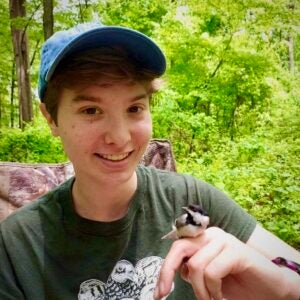
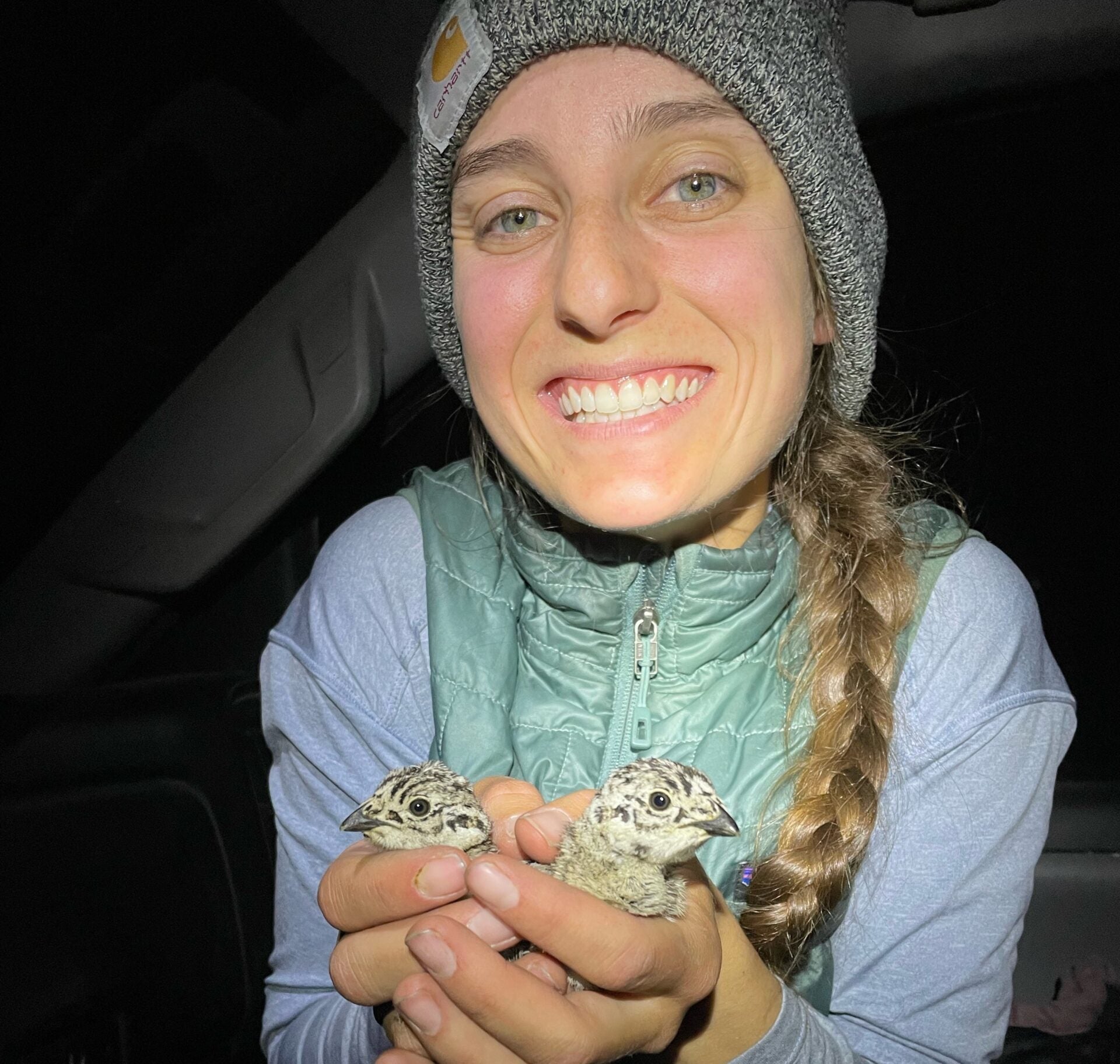
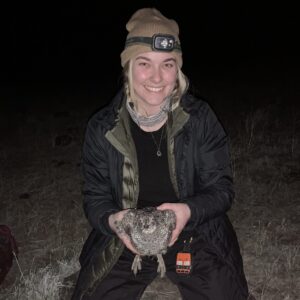
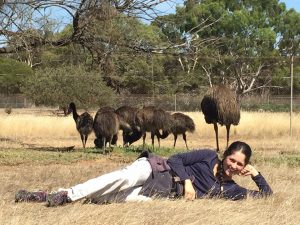
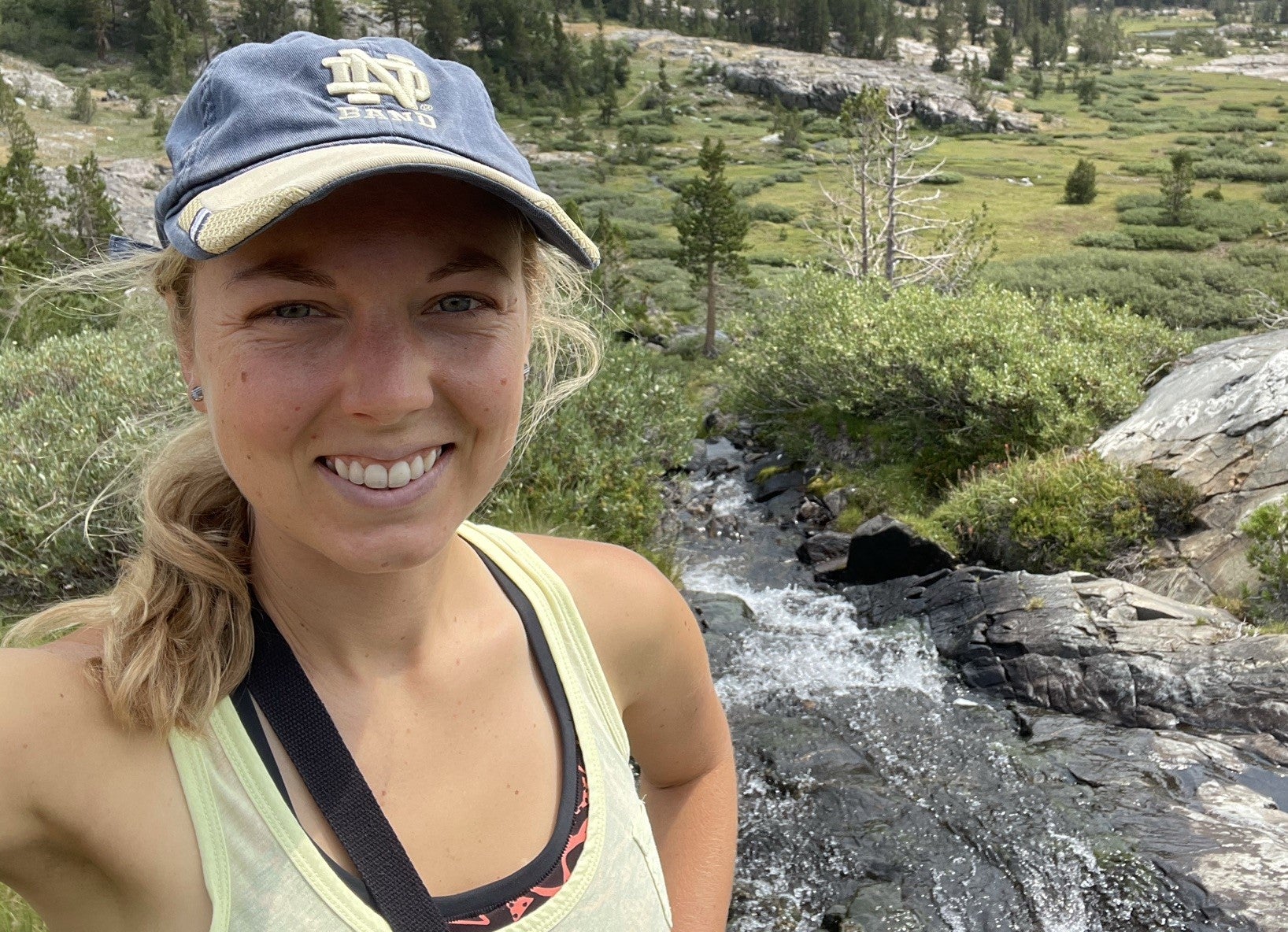
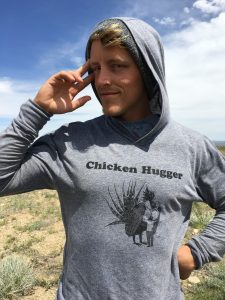
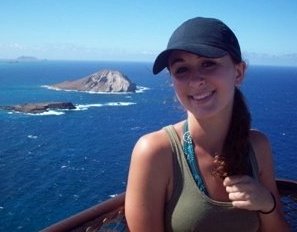
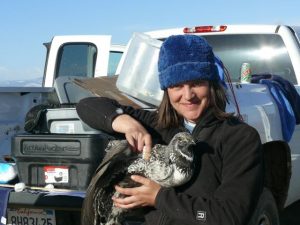
 Melissa A. Blundell
Melissa A. Blundell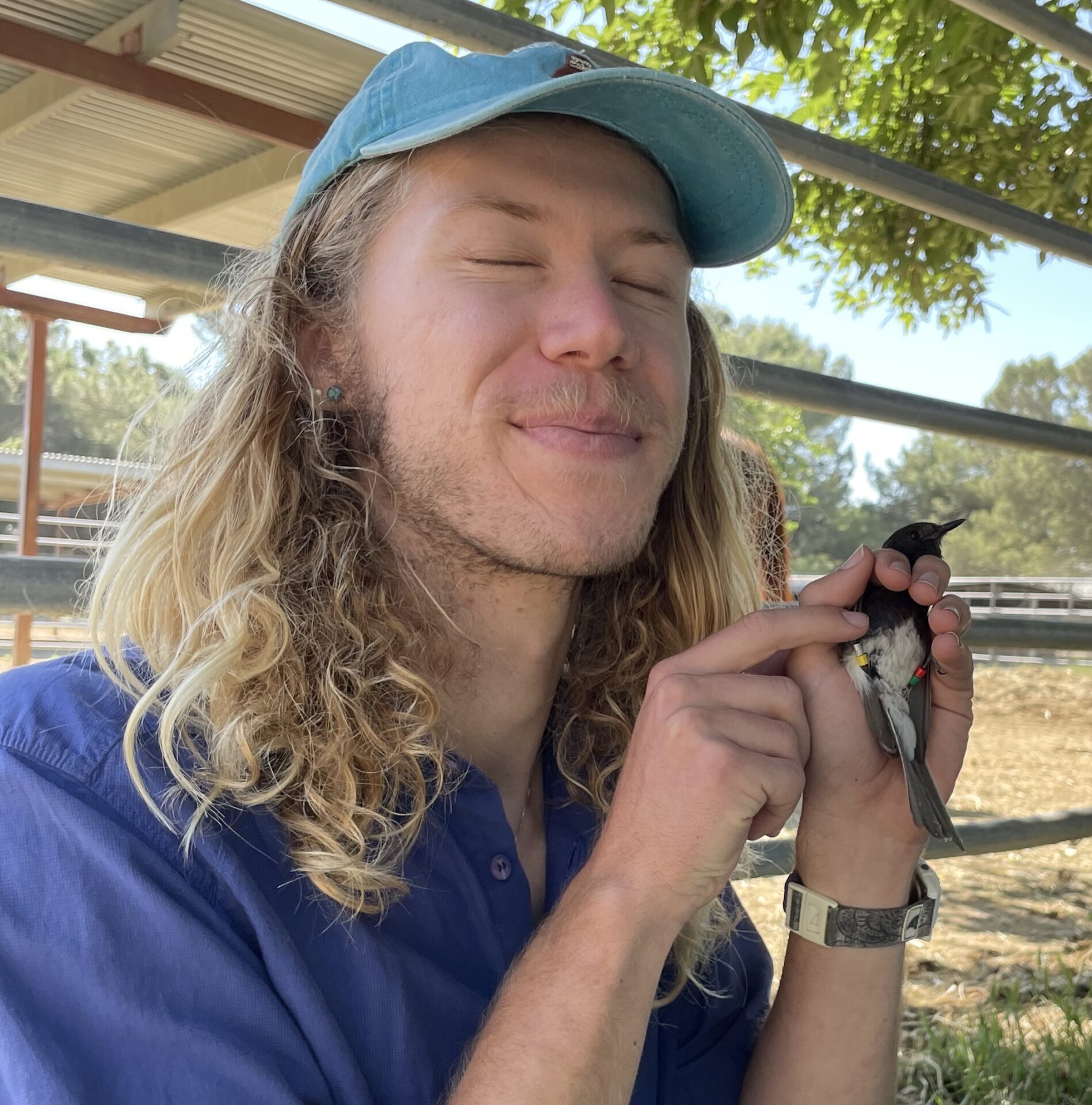
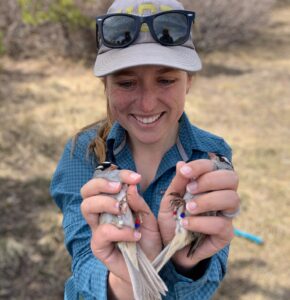
 Teresa L. Iglesias (
Teresa L. Iglesias (
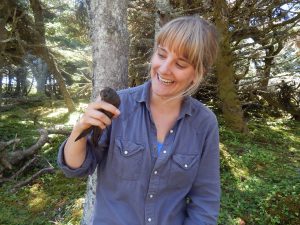 Sarah L. Jennings (
Sarah L. Jennings (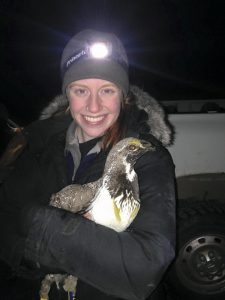
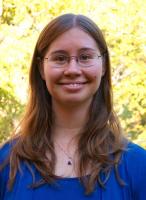
 Jennifer L. Phillips (
Jennifer L. Phillips (